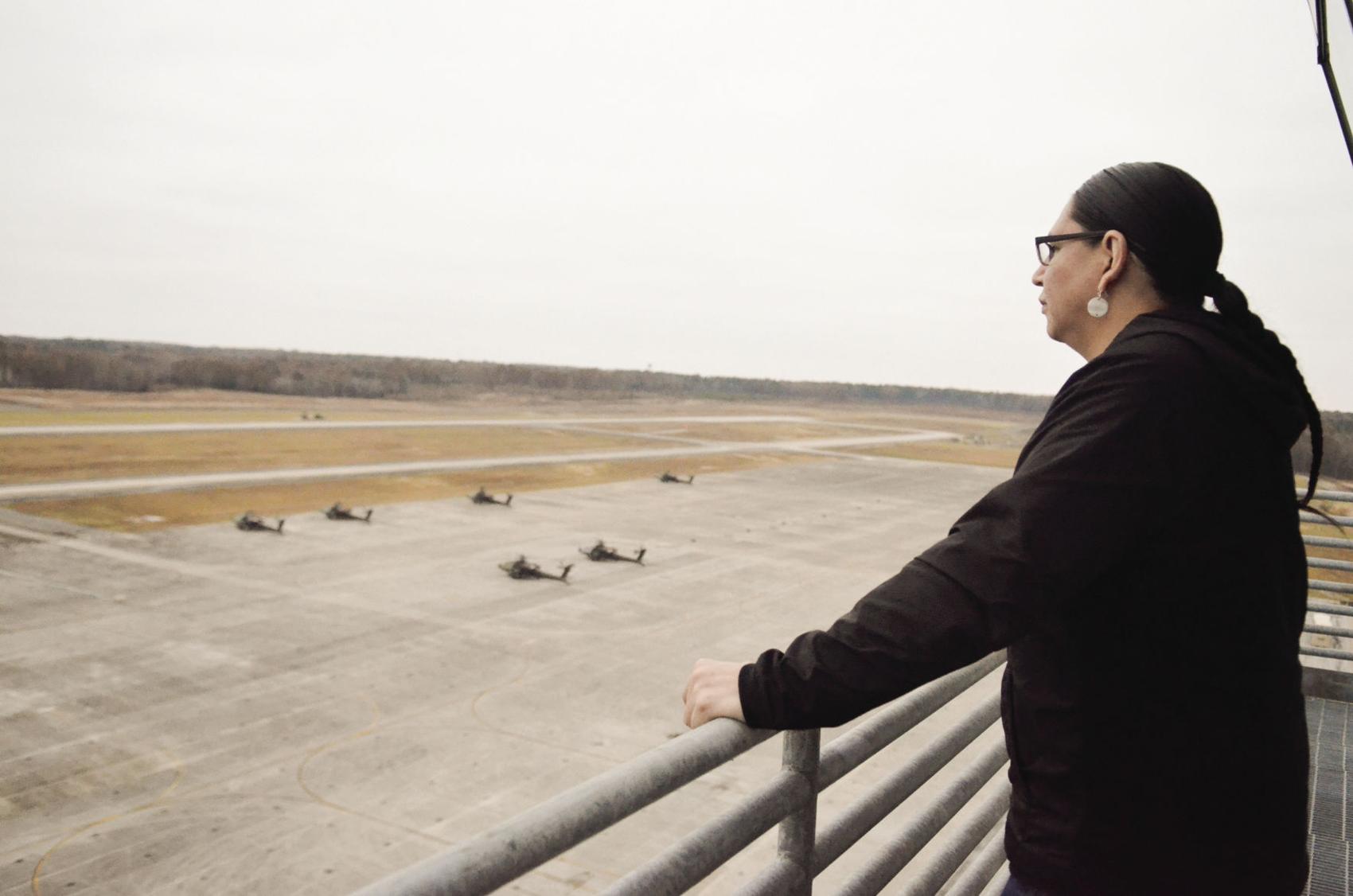Fort Campbell air traffic controller ‘unapologetically Native’

Tighson ‘TI” Lends His Horse, Fort Campbell air traffic controller and Air Force retiree from the Cheyenne River Indian Reservation in North Central South Dakota. (Photo courtesy Fort Campbell Courier)
FORT CAMPBELL, Kentucky – Tighson “TI” Lends His Horse divides his time between his Family and controlling air traffic at Sabre Army Airfield. But regardless of where Lends His Horse is or what function he is performing, he always represents his proud heritage as a Mni’coujou/O’ohenumpa Lakota warrior.
Lends His Horse was born in Eagle Butte, South Dakota, where his tribe resides and his long line of ancestors called home. He is a retired Air Force Staff sergeant and is a sixth generation military service member in his Family.
“It’s a cultural thing,” Lends His Horse said. “We are a warrior society, it’s a tradition in our tribe. My father is prior Army and Air Force, my mother is prior Army, and I come from a Family full of Marine and Navy veterans as well. We are able to help each other out and discuss what branch and career are right for each of us.”
Upon deciding to follow in his Family’s footsteps of serving in the military, a Family friend suggested he look into the air traffic control career field.
“It’s a career of solving puzzles,” Lends His Horse said. “It involves knowledge, mathematics, memory and problem-solving. There is so much more involved than just keeping one aircraft from hitting another. I struggled at first but I had very good mentorship from a civilian air traffic controller, Bob Schuetrum, and my best friend, Chris Hake, who now works at Campbell Army Airfield, and I was able to get through the training. From there, I never turned back and wanted to know everything there was to learn in the field.”
Tighson ‘TI” Lends His Horse, Fort Campbell air traffic controller and Air Force retiree, performed during the He’Sapa Wacipi October 2014 in Rapid City, South Dakota.
Over the course of his 10-year Air Force career, Lends His Horse was stationed at Altus Air Force Base in Oklahoma, Osan American Air Force Base in South Korea, Ellsworth Air Force Base in South Dakota, and deployed to Southwest Asia.
After finishing his service, Lends His Horse took a year before deciding his next steps, eventually realizing he missed life as an air traffic controller.
“I guess you can say it’s a bit of an addiction,” he said. “It can be exciting and stressful depending on the environment and the day, but I come to work every day and I enjoy the career field and have intentions of going further with it.”
Staying connected is not just important to Lends His Horse, it’s a form of survival in his opinion.
He was fortunate to meet his wife three years ago from his own tribe, and together they have three children.
Together, they have established a piece of their tribe and culture far from home, a safe haven to celebrate their heritage and identity.
“Where I come from and in my background, it’s an impossibility to separate my culture from my identity,” Lends His Horse said. “I grew up always knowing who I was, where I came from and that was my life, everything else outside of that came after. The first time I went to a big city outside the reservation it was a culture shock for me. I only knew one thing. I’ve always been a part of it.”
Lends His Horse and his Family speak their native language, Lakota, at home, they attend Pow Wows when they have the opportunity and they engage in spiritual practices often. According to Lends His Horse, his Family is “unapologetically native” and they are proud of it.
“We aren’t all what the stereotypical Native American is perceived to be. We aren’t all on a horse with a spear and war paint and war bonnet fighting the U.S. Cavalry,” Lends His Horse said. “I was rooted in my culture and that is what has kept me through my high school years and when I was away. Being Native was never hard, especially with a last name like Lends His Horse, you catch yourself always explaining your story and so you see everyone’s eyes opening when they realize things they never thought of before about your culture. That’s one thing the military has done, help me open eyes.”
Lends His Horse educates others about his culture, his heritage, and corrects misunderstandings and preconceived notions daily.
“It’s a duty to not only be able to know your heritage and your culture, but to pass those teachings onto people because it does change a lot of perspective,” he said. “The biggest rooting to my culture was wanting more knowledge to inform people correctly so there isn’t misinterpretation of my people and of me.”
If there is one thing Lends His Horse wants people to remember it is how they choose to identify Native Americans.
“I don’t appreciate being called ‘Indian’ if you aren’t Native American,” he said. “Columbus arrived believing he was in the East Indies, so the people he encountered, he naturally called Indians. But we aren’t Indians. The term ‘Indian’ stuck, and many Native Americans view it as a slur. There just aren’t enough of us to voice that this word is offensive for people to realize they are wrong in using the word.”
However, Lends His Horse is generally supported and accepted in his daily life, especially by his coworkers and friends, and he remains steadfast in his warrior tradition by continuing to support the military mission.
“We’re unmistakable, we’re hard to miss, we’re immersed in our culture,” Lends His Horse said. “I was able to move here to Tennessee and unite my culture with it as well. Everything has come full circle. I enjoy every day.”
